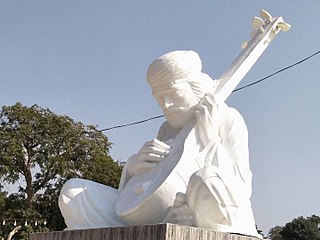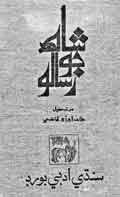Related Research Articles

Shah Abdul Latif Bhittai, commonly known by the honorifics Lakhino Latif, Latif Ghot, Bhittai, and Bhit Jo Shah, was a Sindhi Sufi mystic and poet from Pakistan, widely considered to be the greatest poet of the Sindhi language.

Allan Fakir or Allan Faqir, was a Sindhi folk singer from Sindh, Pakistan. He was particularly known for his ecstatic style of performance, marked with devotional rhetoric and Sufi dance-singing.

Shah Jo Risalo is a book of poems of the Sindhi Sufi poet Shah Abdul Latif Bhittai. Shah Abdul Latif's poetry was transmitted orally during his lifetime and compiled after his death and designated as Shah Jo Risalo or Poetry of Shah.

Sassi Punnu or Sassui Punnhun is a folktale in the Sindhi, Balochi and Punjabi folklore. It is one of the seven popular tragic romances of Sindh. The other six are Umar Marvi, Momal Rano, Sohni Mehar, Lilan Chanesar, Sorath Rai Diyach, and Noori Jam Tamachi. In Punjab, it is four of the most popular romances. The other three are Heer Ranjha, Sohni Mahiwal and Mirza Sahiban. It also remains one of the most popular folktales in Balochistan. The story is about a faithful lover who will endure any difficulty while seeking her beloved husband who was separated from her by rivals.
Sindhi literature is the collection of oral and written literature in the Sindhi language in prose and poetry. The Sindhi language of the province of Sindh in Pakistan is considered one of the oldest languages of ancient India, and influenced the language of Indus Valley inhabitants. Sindhi literature has developed over a thousand years.
Nabi Bakhsh Khan Baloch was a Baloch research scholar, historian, sindhologist, educationist, linguist and writer. He predominantly wrote in Sindhi, but sometimes in Urdu, English, Persian and Arabic. He has been described as the "moving library" of the Pakistani province of Sindh.
Umar Marvi is a folktale from Sindh, Pakistan about a village girl Marvi, who resists the overtures of a powerful King and the temptation to live in the palace as a queen, preferring to be in a simple rural environment with her own village folk.
Zarina Baloch was a Pakistani folk music singer, vocalist and composer. She was also an actress, Radio and TV artist, writer, teacher for over 30 years, political activist and social worker.

Anwar Pirzada, was a journalist, columnist, writer and expert on Sindhi history, language and Shah Abdul Latif Bhittai's poetry.
Dr Fahmida Hussain was born in a literary family on July 5, 1948, in Tando Jam in district Hyderabad Sindh, Pakistan. Her father Mohammad Yakoon "Niaz" was also a scholar who had translated poetry of Hafiz Shirazi from Persian to Sindhi language. Her brother Sirajul Haq Memon was also a well-known author and researcher. She is a well-known author, scholar, linguist and intellectual of Pakistan. Her fields of work have been: Literature, Linguistics, Woman studies and Anthropology. Her specialization is in the study of the great classical mystic poet Shah Abdul Latif Bhittai. Dr Fahmida was the Chairperson of Sindhi Language Authority from May 2008 to March 2015. Before that she had served as Director of Shah Abdul Latif Chair, University of Karachi for ten years. Prior to that she had also served as Professor and Chairperson of the Department of Sindhi in the same university. Dr Fahmida Hussain is a prolific writer who has more than 15 books to her credit along with several research articles on the subjects of Literary Criticism, Linguistics with special reference to different aspects of Sindhi language, poetry of Shah Abdul Latif Bhittai and gender issues. She started writing short stories and poetry from a very young age and has to her credit one book of short stories as well. She has been writing columns, articles and critiques in various newspapers and magazines from the last 40 years. She is married to Abdul Hussain and they have 3 children. Dr Sunita Hussain, Aruna Hussain and a son Shahmir Hussain.
Ustad Muhammad Juman was a Sindhi musician and classical singer from Pakistan, whose impact on Sindhi music is still pervasive.

Mai Bhagi was a Sindhi folk musician, born Bhag Bhari in Mithi in Thar, Sindh. Mai Bhagi grew up in a village in the Thar Desert. Her father was Wanhyun Fakir and her mother was Khadija Maganhar. Both her parents were known singers in their region at that time.
Pakistani folk music refers to the local genre of folk music that originates from Pakistan.

Sorath Rai Diyach is a romantic folktale in Sindhi and Gujarati folklore. The story also appears in Shah Jo Risalo and forms part of seven popular tragic romances from Sindh. The other six tales are Umar Marvi, Sassui Punnhun, Sohni Mehar, Lilan Chanesar, Noori Jam Tamachi and Momal Rano commonly known as the Seven Queens of Sindh, or the Seven heroines of Shah Abdul Latif Bhittai.
Ustad Manzoor Ali Khan was a Pakistani singer belonging to the Gwalior gharana singing style, one of the oldest singing traditions in Hindustani classical music. Born in Shikarpur, Sindh, Pakistan, he was the first classical musician of the twentieth century who knew about the regional music of Sindh.
Jan Muhammad Khaskheli was a classical singer from Sindh, Pakistan. He was son of Bachal Khaskheli.
Hyderabad Literature Festival is an annual literary gathering organized by Academy for Promotion of Art, Literature and Literacy (APAL) in Hyderabad, Sindh.

Latif Award is given by Department of Culture, Tourism and Antiquities, government of Sindh to the best researchers and singers of Shah Abdul Latif Bhittai who made extraordinary work in Arts and Research field related with mystic poetry of Shah Abdul Latif Bhittai, Sindhi language and Sindhi music. This award is a highest cultural decoration given by Government of Sindh. The award is given on Urs of Shah Abdul Latif Bhittai each year. Latif Award is a unique golden model of Tamboro, a stringed music instrument, which is said to be invented by Shah Abdul Latif Bhittai himself.

Allah Bachayo Khoso was a popular Sindhi Folk artist and Alghoza player.

Ayaz Gul is a prominent contemporary poet from Sindh, Pakistan. His works are in the indigenous Sindhi language. He was honoured with the Pride of Performance for literature by President Arif Alvi in 2021.
References
- ↑ "Resonance of heritage: Sindhi musicians willing to give away life for Sur - The Express Tribune". The Express Tribune. 2013-12-03. Retrieved 2018-04-07.
- ↑ "Mai Allah Wassai - Sindhipedia". sindhipedia.org. Retrieved 2018-04-07.
- 1 2 Tunio, Aftab. "صدارتي ايوارڊ يافتھ لوڪ ڳائڻي مائي الله وسائي جي وڇوڙي کي 13 سال وهامي ويا". www.awaztv.tv (in Sindhi). Retrieved 2018-04-07.
- ↑ "- YouTube". YouTube .
- ↑ Muhammad, Ghulam. "Mai Allah Wasai Sindhi Folk Music". www.mediamusicmania.com. Retrieved 2018-04-06.
- ↑ Abbas, Shemeem Burney (2003-01-01). The Female Voice in Sufi Ritual: Devotional Practices of Pakistan and India. University of Texas Press. ISBN 9780292705159.
- ↑ "Twenty-six awards on Pakistan Day". www.thenews.com.pk. Retrieved 2018-04-06.
- ↑ Report, Bureau (2003-04-21). "HYDERABAD: Global moots on Bhitai proposed". DAWN.COM. Retrieved 2018-04-06.